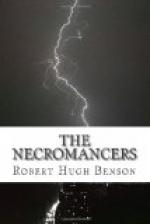It seemed full then of a mysterious splendor when she entered it this evening, candle in hand, and stood regarding it from the threshold. To the outward eye it was nothing very startling. A shrouded bed protruded from the wall opposite with the words “The Lord preserve thee from all evil” illuminated in pink and gold by the girl’s own hand. An oleograph of Queen Victoria in coronation robes hung on one side and the painted photograph of a Nonconformist divine, Bible in hand, whiskered and cravatted, upon the other. There was a small cloth-covered table at the foot of the bed, adorned with an almost continuous line of brass-headed nails as a kind of beading round the edge, in the center of which rested the plaster image of a young person clasping a cross. A hymn-book and a Bible stood before this, and a small jar of wilted flowers. Against the opposite wall, flanked by dejected-looking wedding-groups, and another text or two, stood the great mahogany wardrobe, whose removal was vaguely in contemplation.
Mrs. Nugent regarded the whole with a tender kind of severity, shaking her head slowly from side to side, with the tin candlestick slightly tilted. She was a full-bodied lady, in clothes rather too tight for her, and she panted a little after the ascent of the stairs. It seemed to her once more a strangely and inexplicably perverse act of Providence, to whom she had always paid deference, by which so incalculable a rise in the social scale had been denied to her.
Then she advanced a step, her eyes straying from the shrouded bed to the wardrobe and back again. Then she set the candlestick upon the table and turned round.
It must now be premised that Mrs. Nugent was utterly without a trace of what is known as superstition; for the whole evidential value of what follows, such as it is, depends upon that fact. She would not, by preference, sleep in a room immediately after a death had taken place in it, but solely for the reason of certain ill-defined physical theories which she would have summed up under the expression that “it was but right that the air should be changed.” Her views on human nature and its component parts were undoubtedly practical and common-sense. To put it brutally, Amy’s body was in the churchyard and Amy’s soul, crowned and robed, in heaven; so there was no more to account for. She knew nothing of modern theories, nothing of the revival of ancient beliefs; she would have regarded with kindly compassion, and met with practical comments, that unwilling shrinking from scenes of death occasionally manifested by certain kind of temperaments.
She turned, then, and looked at the wardrobe, still full of Amy’s belongings, with her back to the bed in which Amy had died, without even the faintest premonitory symptom of the unreasoning terror that presently seized upon her.
It came about in this way.
She kneeled down, after a careful scrutiny of the polished surface of the mahogany, pulled out a drawer filled to brimming over with linen of various kinds and uses, and began to dive among these with careful housewifely hands to discover their tale. Simultaneously, as she remembered afterwards, there came from the hill leading down from the direction of the station, the sound of a trotting horse.




